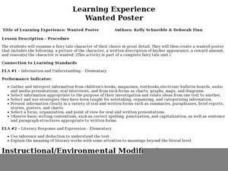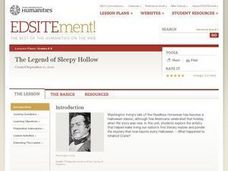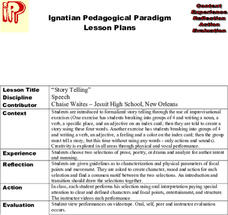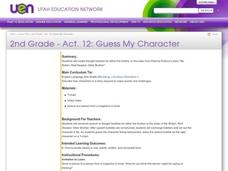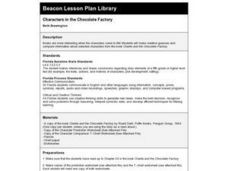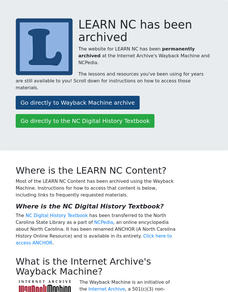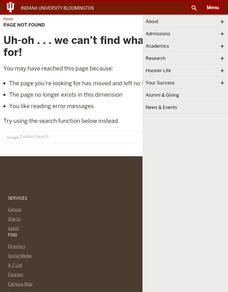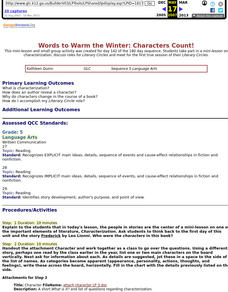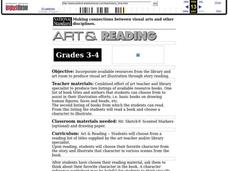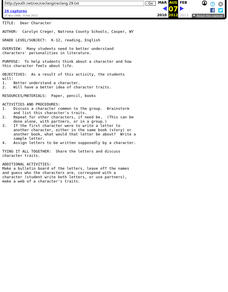Curated OER
Phenomenology Lesson Plan #4: Character Part 1
Young scholars examine the way they react to characters and text. They write respones to different media tests. They are required to bring in a photograph and create a mini-biography for homework.
Curated OER
Wanted Poster
Students examine a fairy tale character of their choice in great detail. They create a wanted poster that includes the following: a picture of the character, a written description of his/her appearance, a reward amount, and reasonthe...
Curated OER
Goodness! Gorillas in Our Community!
Students discuss the story Goodness! Gorillas in Our Community! and create character maps from it. They practice qualities of community membership and write about and illustrate these qualities.
Curated OER
Teaching Language Arts in Kindergarten Using Stories, Aesop's Fables, and Tall Tales
Students search into a variety of story elements in the eight lessons of this unit. The title, author, illustrator, setting, main character, problem, solution, events and the story are the components of the lessons.
Curated OER
Essential Narrative Concepts
Students interact with the main concepts of a narrative text in the six lessons of this unit. The setting, prediction, retelling, sequencing, and the identification of the beggining, middle and end of a story are investigated.
Curated OER
The Legend of Sleepy Hollow
Fourth graders read The Legend of Sleepy Hollow aloud, make predictions, compare characters, discuss plot and setting, and rewrite the ending to the story.
Curated OER
The Art of Charity in Characterization
Young scholars garner knowledge of characterization of the pilgrims in Chaucer's Canterbury Tales and see that even the less savory characters must be flushed out in description of personality and physical traits.
Curated OER
Story Telling
Students, through the use of 4 different improvisational exercises, discover how to tell effective stories. They chose 2 selections and perform them, using the interesting methods they learned.
Curated OER
Guess My Character
Second graders create thought bubbles for either the brother or the sister from Patricia Polacco's "My Rotten, Red-Headed, Older Brother." They exchange bubbles and act out the characters and guess the character being represented.
Curated OER
Storytelling and Drawing
Learners orally retell the Yosemite Miwok legends and design accompanying artistic depictions. They discover the various storytelling elements, such as plot and theme.
Curated OER
Mapping Shakespeare
Twelfth graders read a Shakespearean play focusing on a character. They create "Mind Maps" of their characters and act out a selection of the play.
Curated OER
Speak What We Feel, Not What We Ought to Say
Young scholars examine and create their own interpretation of a particular character from the play, King Lear. They read the speeches, write a paragraph about their character, and present a short performance of their scene.
Curated OER
Othello's Father of the Bride
Students read and analyze Act one of the play Othello. They examine the themes of love and marriage and interpret Brabantio's words by using different subtexts.
Curated OER
Characters in the Chocolate Factory
Learners dress and act as selected characters from Roald Dahl's "Charlie and the Chocolate Factory". They identify each other and make predictions about the upcoming chapters based on their observations about the characters.
Curated OER
Reading Stories in Art
Young scholars study how artists tell stories using visual images by identifying and comparing elements of narrative (setting, characters, and plot) in a painting and a Greek vase.
Curated OER
Illustrate With Character
Learners examine character traits and apply characteristics of those traits to images and quotations. They design, save and print using a desktop publishing program. They utilize reference tools to locate quotations.
Curated OER
Using Inspiration Software to Explore Characters In Stories
Students identify characters, their qualities, and examples of their qualities and use Inspiration to organize them in a clear and understandable format. After a lecture/demo, students use the program on the next story by themselves.
Curated OER
Good Prevails
Students write descriptive paragraphs of characters after reading a Japanese folktale in which characters represent by good and evil.
Curated OER
Words to Warm the Winter: Characters Count!
Fifth graders take part in a mini-lesson on characterization, discuss roles for Literary Circles and meet for the first true session of their Literary Circles.
Curated OER
All About Me
Students practice biographical and autobiographical forms of writing: autobiography, biopoem, character traits, classmate biography.
Curated OER
Dear Character
Third graders examine and better explain a character and their traits by writing a letter from their point of view.
Curated OER
Story Time
Students incorporate available resources from the library and art room to produce visual art illustration through story reading.
Curated OER
Dear Character
Students think about a character and how this character feels about life. This lesson plan can be used with virtually any grade level. They better explain a character, and identify character traits.



